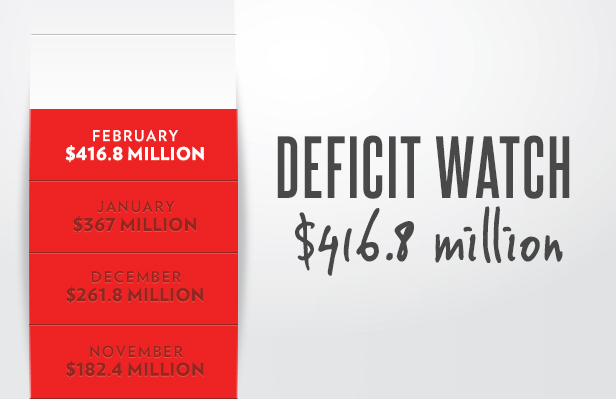Media

Pennsylvania Deficit Watch: February 2017
Revenue collections underperformed again in January, according to the Department of Revenue. This is the third straight month—and the sixth of the last seven—in which revenue collections fell short of official estimates.
The state collected $2.6 billion last month—$49.8 million or 1.8 percent less than anticipated. To date, revenue collections are approximately $416.8 million below estimates.
The $1.3 billion revenue package enacted in July has not generated enough revenue to pay for the state’s $1.6 billion spending increase. The package included $650 million in tax hikes, which not only failed to balance the state budget but also destroyed jobs throughout the commonwealth.
The latest revenue estimates from the Independent Fiscal Office (IFO) suggest the state will end the year with a deficit exceeding $700 million absent any significant policy changes or revisions to the state’s balance sheet.
The IFO warned about optimistic revenue projections back in August. At the time, the IFO identified major problems with the legislature’s assumptions and adjusted projections to account for them:
- The legislature moved the Commonwealth Financing Authority (CFA) out of the General Fund Budget and created a new fund via the fiscal code. Legislative leaders have expressed an interest in passing gambling expansion to generate $100 million to cover CFA spending, but the proposal is still in the early stages of the legislative process. The IFO deducted $95 million from sales tax revenue to pay for CFA’s expenses.
- The legislature predicted Act 39 (wine modernization) would raise $149 million in 2016-17. The IFO projected this number would be just $73 million—a $76 million difference.
- Official projections over-estimated tobacco tax revenue (including taxes on cigarettes, e-cigarettes, loose, and roll-your-own tobacco). The IFO's estimate was $38 million less than official projections.
- Official estimates assumed $75 million from the Philadelphia casino. The IFO does not expect the casino will generate revenue this fiscal year.
Though some of the above projections have changed, its clear Pennsylvania's current state budget was unbalanced from the start.
Acknowledging the seriousness of the commonwealth's financial position, legislative leaders and Gov. Wolf have committed to restructuring government. To achieve this goal, policymakers have a number of options, including a host of ideas found in our policy brief, Embracing Innovation in State Government. Our recommendations include, but are not limited to, the following:
- Scaling back $800 million in arbitrary corporate welfare,
- Reducing spending outside of the General Fund, and
- Maintaining a hiring freeze and issuing a travel ban.
With five months left in the fiscal year, revenue collections aren’t likely to improve much, if at all. A plan to reduce spending is needed soon to ensure spending matches revenues come June. The last thing Pennsylvanians need is another tax hike.